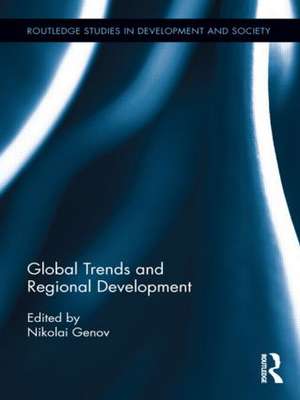Global Trends and Regional Development: Routledge Studies in Development and Society
Editat de Nikolai Genoven Limba Engleză Paperback – 23 mai 2013
This edited collection is dedicated to the discussion of four global trends: upgrading the rationality of organizations, individualization, the spreading of instrumental activism and universalization of value-normative systems. The mutual influence of these interrelated trends brings about both constructive and destructive effects in social life, social integration and change.
Contributors examine questions such as: How do global trends pave their way in regions? What are the similarities and differences of regional development? How do agencies cope with the challenges of global trends in regional development?
| Toate formatele și edițiile | Preț | Express |
|---|---|---|
| Paperback (1) | 437.13 lei 43-57 zile | |
| Taylor & Francis – 23 mai 2013 | 437.13 lei 43-57 zile | |
| Hardback (1) | 1066.79 lei 43-57 zile | |
| Taylor & Francis – 23 sep 2011 | 1066.79 lei 43-57 zile |
Din seria Routledge Studies in Development and Society
- 18%
 Preț: 1002.18 lei
Preț: 1002.18 lei -
 Preț: 298.74 lei
Preț: 298.74 lei -
 Preț: 311.41 lei
Preț: 311.41 lei -
 Preț: 353.18 lei
Preț: 353.18 lei -
 Preț: 431.73 lei
Preț: 431.73 lei -
 Preț: 434.63 lei
Preț: 434.63 lei - 28%
 Preț: 791.64 lei
Preț: 791.64 lei - 18%
 Preț: 1063.31 lei
Preț: 1063.31 lei -
 Preț: 411.42 lei
Preț: 411.42 lei - 26%
 Preț: 820.32 lei
Preț: 820.32 lei -
 Preț: 480.44 lei
Preț: 480.44 lei - 25%
 Preț: 823.81 lei
Preț: 823.81 lei - 16%
 Preț: 275.88 lei
Preț: 275.88 lei - 26%
 Preț: 876.21 lei
Preț: 876.21 lei - 18%
 Preț: 1068.88 lei
Preț: 1068.88 lei -
 Preț: 486.42 lei
Preț: 486.42 lei - 12%
 Preț: 314.79 lei
Preț: 314.79 lei -
 Preț: 404.68 lei
Preț: 404.68 lei - 18%
 Preț: 1069.23 lei
Preț: 1069.23 lei - 18%
 Preț: 1276.52 lei
Preț: 1276.52 lei - 18%
 Preț: 1066.79 lei
Preț: 1066.79 lei -
 Preț: 437.13 lei
Preț: 437.13 lei -
 Preț: 389.70 lei
Preț: 389.70 lei -
 Preț: 407.19 lei
Preț: 407.19 lei -
 Preț: 433.48 lei
Preț: 433.48 lei - 25%
 Preț: 823.17 lei
Preț: 823.17 lei -
 Preț: 357.81 lei
Preț: 357.81 lei - 18%
 Preț: 1059.48 lei
Preț: 1059.48 lei - 18%
 Preț: 1057.89 lei
Preț: 1057.89 lei - 18%
 Preț: 1108.37 lei
Preț: 1108.37 lei - 18%
 Preț: 1062.26 lei
Preț: 1062.26 lei -
 Preț: 446.53 lei
Preț: 446.53 lei - 16%
 Preț: 234.90 lei
Preț: 234.90 lei - 18%
 Preț: 1056.00 lei
Preț: 1056.00 lei -
 Preț: 432.29 lei
Preț: 432.29 lei - 25%
 Preț: 852.88 lei
Preț: 852.88 lei
Preț: 437.13 lei
Nou
Puncte Express: 656
Preț estimativ în valută:
83.65€ • 87.55$ • 69.62£
83.65€ • 87.55$ • 69.62£
Carte tipărită la comandă
Livrare economică 31 martie-14 aprilie
Preluare comenzi: 021 569.72.76
Specificații
ISBN-13: 9780415848725
ISBN-10: 0415848725
Pagini: 348
Ilustrații: 15 black & white illustrations, 34 black & white tables, 7 black & white halftones, 8 black & white line drawings
Dimensiuni: 152 x 229 x 230 mm
Greutate: 0.48 kg
Ediția:1
Editura: Taylor & Francis
Colecția Routledge
Seria Routledge Studies in Development and Society
Locul publicării:Oxford, United Kingdom
ISBN-10: 0415848725
Pagini: 348
Ilustrații: 15 black & white illustrations, 34 black & white tables, 7 black & white halftones, 8 black & white line drawings
Dimensiuni: 152 x 229 x 230 mm
Greutate: 0.48 kg
Ediția:1
Editura: Taylor & Francis
Colecția Routledge
Seria Routledge Studies in Development and Society
Locul publicării:Oxford, United Kingdom
Public țintă
Postgraduate and UndergraduateCuprins
1. Introduction: The Challenge of Four Global Trends Nikolai Genov Part I: Upgrading the Rationality of Organizations 2. Values and Interests in Processes of Macro-Regional Integration Max Haller 3. The European Union and NAFTA as Models of Regional Organization Jan-Erik Lane 4. Contradictions in European Integration: A Global Perspective Chris Rumford and Didem Buhari-Gulmez 5. Regional Integration in East Asia as a Reaction to Global Challenges Patrick Ziltener Part II: Individualization 6. Elitist Distinction and Globalization Jean-Pascal Daloz 7. European Elites' Threat Perception and Preferences Concerning Crisis Management György Lengyel 8. Individualization under Precarious Conditions Elena Danilova 9. Globalization and the Transformation of Gender-Relations in Asia Habibul Haque Khondker Part III: Spreading of Instrumental Activism 10. Regional Varieties of Global Inequalities: Reclaiming Space for Public Policies Klaus Müller 11. Changing Market Conditions and the Welfare State Martin Seeleib-Kaiser 12. Globalization and Increasing Inequality in East Asia: The Case of Japan and South Korea Jin-Wook Shin 13. Social Fields of Technological Innovation Borut Rončević and Dolores Modic Part IV: Universalization of Value-Normative Systems 14. Universalism, Particularism and Moral Change: Reflections on the Value-Normative Concepts of the Social Sciences Stephen P. Turner 15. New Forms of Reflexive Ethnization: Value-Normative Universalism and Ethnic Particularisms Mathias Bös 16. Universal Values and Geopolitical Interests: China and India in the Global Competition Emilian Kavalski 17. Neo-Liberalism and Civil Society: Sweden and United States in Comparison Sven Eliaeson 18. Conclusion: Striking the Balance and Looking Forward Nikolai Genov
Descriere
For millennia, contact between societies was limited to trade or wars, a situation that changed profoundly with the development of global markets serving industrialization. The outcome was the emergence of one global human civilization, and one common future that will depend on the capacity of individuals and societies to manage the potentials for social development.
This edited collection is dedicated to the discussion of four global trends: upgrading the rationality of organizations, individualization, the spreading of instrumental activism and universalization of value-normative systems. The mutual influence of these interrelated trends brings about both constructive and destructive effects in social life, social integration and change.
Contributors examine questions such as: How do global trends pave their way in regions? What are the similarities and differences of regional development? How do agencies cope with the challenges of global trends in regional development?
This edited collection is dedicated to the discussion of four global trends: upgrading the rationality of organizations, individualization, the spreading of instrumental activism and universalization of value-normative systems. The mutual influence of these interrelated trends brings about both constructive and destructive effects in social life, social integration and change.
Contributors examine questions such as: How do global trends pave their way in regions? What are the similarities and differences of regional development? How do agencies cope with the challenges of global trends in regional development?











